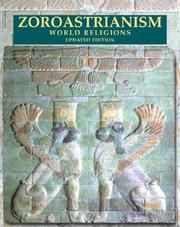| Listing 1 - 10 of 20 | << page >> |
Sort by
|
Book
Year: 1905 Publisher: Paris : Dujarric & cie,
Abstract | Keywords | Export | Availability | Bookmark
 Loading...
Loading...Choose an application
- Reference Manager
- EndNote
- RefWorks (Direct export to RefWorks)
Parsis --- Zoroastrisme --- Parsis --- Zoroastrisme
Book
Abstract | Keywords | Export | Availability | Bookmark
 Loading...
Loading...Choose an application
- Reference Manager
- EndNote
- RefWorks (Direct export to RefWorks)
Parsees --- Orientalists --- Parsis --- Orientalistes --- Anquetil-Duperron,
Book
Year: 1961 Volume: 8 Publisher: Stuttgart : A. Hiersemann,
Abstract | Keywords | Export | Availability | Bookmark
 Loading...
Loading...Choose an application
- Reference Manager
- EndNote
- RefWorks (Direct export to RefWorks)
Zoroastrianism --- Parsees --- Symbolism --- Zoroastrisme --- Parsis --- Symbolisme
Book
ISBN: 1477320814 1477320792 1477320822 9781477320815 9781477320792 Year: 2020 Publisher: Austin
Abstract | Keywords | Export | Availability | Bookmark
 Loading...
Loading...Choose an application
- Reference Manager
- EndNote
- RefWorks (Direct export to RefWorks)
"After the Muslim conquest of Iran in the 7th century, devoted Zoroastrians emigrated to India, where the growing community came to be known as Parsis. This Parsi settlement had increasingly little contact with Iran over the succeeding centuries until the 19th century, when a romanticized notion of their ancestral homeland led them to reestablish contact with Iran and the remaining Zoroastrians there. The Parsis had thrived under British rule of India and so they were able to strengthen their ties to Iran with philanthropic work. Meanwhile, Iranians were coming to romanticize their own ancient history and saw the Parsis as a living embodiment of this history. The Iranian neo-classicism of the 20th century that helped to establish a sense of Iranian national identity is usually ascribed to European contact, but Marashi argues that this growing relationship with the Parsi community was an important element that influenced the development of modern-day Iran"--
Parsees --- Zoroastrians --- History. --- Religious adherents --- Parsis --- Fire-worshipers --- Iran
Book
ISBN: 2911416880 9782911416880 Year: 2003 Publisher: Paris : Imago,
Abstract | Keywords | Export | Availability | Bookmark
 Loading...
Loading...Choose an application
- Reference Manager
- EndNote
- RefWorks (Direct export to RefWorks)
Zoroastrianism --- Parsees --- Zoroastrians --- Zoroastrisme --- Parsis --- Zoroastriens --- Zoroastrisme -- Inde --- Zoroastrisme -- Iran --- Guèbres
Book
ISBN: 0710001215 9780710001214 Year: 1979 Publisher: London ; Boston : Routledge & Kegan Paul,
Abstract | Keywords | Export | Availability | Bookmark
 Loading...
Loading...Choose an application
- Reference Manager
- EndNote
- RefWorks (Direct export to RefWorks)
Zoroastrianism --- Parsees --- Zoroastrisme --- Parsis --- History --- Histoire --- History. --- Zoroastrianism - History --- Parsees - History
Book
ISBN: 9781107047976 1107047978 9781107256545 9781107661882 1107661889 1139862332 1139699288 113986324X 1107256542 1139861107 1139865382 1139871102 1139868950 9781139871105 9781139865388 9781139699280 9781139862332 9781139861106 9781139868952 9781139863247 Year: 2014 Publisher: New York
Abstract | Keywords | Export | Availability | Bookmark
 Loading...
Loading...Choose an application
- Reference Manager
- EndNote
- RefWorks (Direct export to RefWorks)
This book explores the legal culture of the Parsis, or Zoroastrians, an ethnoreligious community unusually invested in the colonial legal system of British India and Burma. Rather than trying to maintain collective autonomy and integrity by avoiding interaction with the state, the Parsis sank deep into the colonial legal system itself. From the late eighteenth century until India's independence in 1947, they became heavy users of colonial law, acting as lawyers, judges, litigants, lobbyists, and legislators. They de-Anglicized the law that governed them and enshrined in law their own distinctive models of the family and community by two routes: frequent intra-group litigation often managed by Parsi legal professionals in the areas of marriage, inheritance, religious trusts, and libel, and the creation of legislation that would become Parsi personal law. Other South Asian communities also turned to law, but none seems to have done so earlier or in more pronounced ways than the Parsis.
Parsees --- Legal status, laws, etc. --- History. --- Parsis --- Religious adherents --- Fire-worshipers --- Zoroastrians

ISBN: 0816057230 Year: 2004 Publisher: New York, NY Facts on File, Inc.
Abstract | Keywords | Export | Availability | Bookmark
 Loading...
Loading...Choose an application
- Reference Manager
- EndNote
- RefWorks (Direct export to RefWorks)
Zarathustra --- Zoroastrianism --- history --- India --- the Parsis --- the Avesta --- philosophy --- ethics --- rituals --- rites of passage

ISBN: 9004062084 9789004062085 Year: 1980 Volume: 4 Publisher: Leiden Brill
Abstract | Keywords | Export | Availability | Bookmark
 Loading...
Loading...Choose an application
- Reference Manager
- EndNote
- RefWorks (Direct export to RefWorks)
Comparative religion --- Iconography --- Zarathustra --- Iran --- Zoroastrianism --- Zoroastrianism. --- 295.4 --- Mazdaism --- Mazdeism --- Religions --- Mithraism --- 295.4 Zoroastrisme. Mazdaisme. Zend-Avesta. Zarathoestra --- Zoroastrisme. Mazdaisme. Zend-Avesta. Zarathoestra --- Parsees --- Zoroastrisme --- Parsis
Book
ISBN: 0710201567 Year: 1987 Publisher: London : Routledge and Kegan Paul,
Abstract | Keywords | Export | Availability | Bookmark
 Loading...
Loading...Choose an application
- Reference Manager
- EndNote
- RefWorks (Direct export to RefWorks)
Parsees --- Zoroastrianism --- Parsis --- Zoroastrisme --- History --- Histoire --- 295.4 --- 295.4 Zoroastrisme. Mazdaisme. Zend-Avesta. Zarathoestra --- Zoroastrisme. Mazdaisme. Zend-Avesta. Zarathoestra --- History.
| Listing 1 - 10 of 20 | << page >> |
Sort by
|

 Search
Search Feedback
Feedback About UniCat
About UniCat  Help
Help News
News